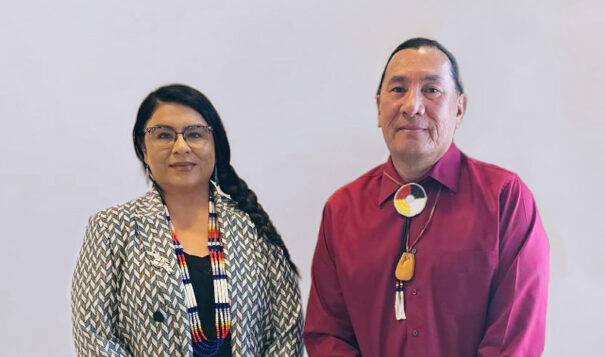
- Details
- By Adrianna Adame
Native Vote. Legal advocates for tribes remain optimistic as a U.S. appeals court deliberates over North Dakota’s challenge to recent Native voting rights victories.
A lower court has ordered the state to adopt redistricting maps proposed by the Turtle Mountain Band of Chippewas and the Spirit Lake Nation. The ruling would enforce parity for the reservations’ electorate in the upcoming 2024 races. Rather than comply, Secretary of State Michael Howe appealed the case to the 8th Circuit Court. The tribes responding by filing a motion March 14 to quash the North Dakota appeal.
[Editor's Note: This article was first published by Buffalo's Fire. Used with persmissio. All rights reserved.]
“We hope and expect this challenge to North Dakota’s Native voters, and voting rights generally, to be rejected in line with decades of precedent,” said Mark Gaber, senior director of redistricting at the nonpartisan Campaign Legal Center.
Gaber contributed to a March 18 brief reiterating that the state’s 2021 redistricting map violates the federal Voting Rights Act and raises concerns over threats to dilute the Native vote. The Native American Rights Fund released the brief.
“In this case, North Dakota was sued under two laws: Section 2 of the Voting Rights Act, which protects each citizen from racially discriminatory voting restrictions and Section 1983, which allows any U.S. citizen to sue when their rights are violated,” said NARF Staff Attorney Michael Carter.
The earlier court ruling declared that the 2021 state legislative map for North Dakota dilutes the votes of Native Americans living in the northeastern part of the state. According to the case document, plaintiffs proved at trial that North Dakota’s map violated Section 2 of the Voting Rights Act. Section 2 prohibits voting practices or procedures that discriminate based on race, color, or membership in one of the language minority groups.
President Lyndon Johnson signed the Voting Rights Act into law in 1965. The VRA sought to outlaw discriminatory voting practices, which the Southern States adopted after the Civil War. The civil and equal rights statute was part of Congress’ Reconstruction Amendment.
The Snyder Act of 1924 recognized full citizenship of American Indians born in the United States. However, the right to vote was up to states’ discretion until passage of the VRA. In states where Natives could participate, they faced deterrents, such as literacy tests, poll taxes and harassment. Post-VRA obstacles, such as gerrymandering, continue to silence the Native vote.
Back in 2020, the Spirit Lake Nation and Standing Rock Sioux Tribe filed an agreement with North Dakota to protect American Indians’ right to vote and relax the state’s ID requirements for voters in tribal jurisdictions. The accord lifted a 2013 restriction on tribal IDs as an acceptable form of identification.
The Native American Rights Fund has helped represent the tribes as they combatted the voter ID restrictions and now the districting issue for the Turtle Mountain Band of Chippewas and the Spirit Lake Nation.
The two tribes and three individual American Indian voters filed suit against the North Dakota Secretary of State for the 2021 configuration of districts 9, 9A, 9B, and 15. The districts dilute the Native vote in the northeastern region of North Dakota by reducing from three to one the number of legislators American Indian voters have an equal opportunity to elect.
Citizens of District 9 in Rolette County have been able to elect one state senator and two state representatives since 1990. Then in September 2021 meetings, the North Dakota Legislative Management Redistricting Committee proposed maps to the public that substantially reconfigured the district and those surrounding it.
The proposal stretched District 9 into parts of two counties to the west, Towner and Cavalier. The additional area consisted mostly of white residents.
Since the U.S. District Court ruled in November 2023 that the state’s 2021 map proposal unlawfully diluted the American Indian vote, the court ordered the state to redraw a new map by December 22, 2023. Failing to comply, Howe and the state remain in court on their appeal.
Sourcing & Methodology Statement:
NARF. (2020, April 24). North Dakota Native Voters Protected. Native American Rights Fund. https://narf.org/nd-voting-rights/’
National Archives and Records Administration. (n.d.). Voting Rights Act (1965). National Archives. https://www.archives.gov/milestone-documents/voting-rights-act
Voters and Tribal Nations Defend Critical Redistricting Win from North Dakota Appeal Attempt. Native American Rights Fund. (2024, March 18). https://narf.org/nd-redistricting-appeal/
Voting Rights for Native Americans: The Right to Vote. The Library of Congress. (n.d.). https://www.loc.gov/classroom-materials/elections/right-to-vote/voting-rights-for-native-americans/
Adrianna Adame -- enrolled Chippewa Cree, Rocky Boy's Reservation in Montana -- is a Report for America corps member covering Indigenous Democracy across the state of North Dakota for Buffalo’s Fire.
Help us defend tribal sovereignty.
At Native News Online, our mission is rooted in telling the stories that strengthen sovereignty and uplift Indigenous voices — not just at year’s end, but every single day.
Because of your generosity last year, we were able to keep our reporters on the ground in tribal communities, at national gatherings and in the halls of Congress — covering the issues that matter most to Indian Country: sovereignty, culture, education, health and economic opportunity.
That support sustained us through a tough year in 2025. Now, as we look to the year ahead, we need your help right now to ensure warrior journalism remains strong — reporting that defends tribal sovereignty, amplifies Native truth, and holds power accountable.
 The stakes couldn't be higher. Your support keeps Native voices heard, Native stories told and Native sovereignty defended.
The stakes couldn't be higher. Your support keeps Native voices heard, Native stories told and Native sovereignty defended.
Stand with Warrior Journalism today.
Levi Rickert (Potawatomi), Editor & Publisher

